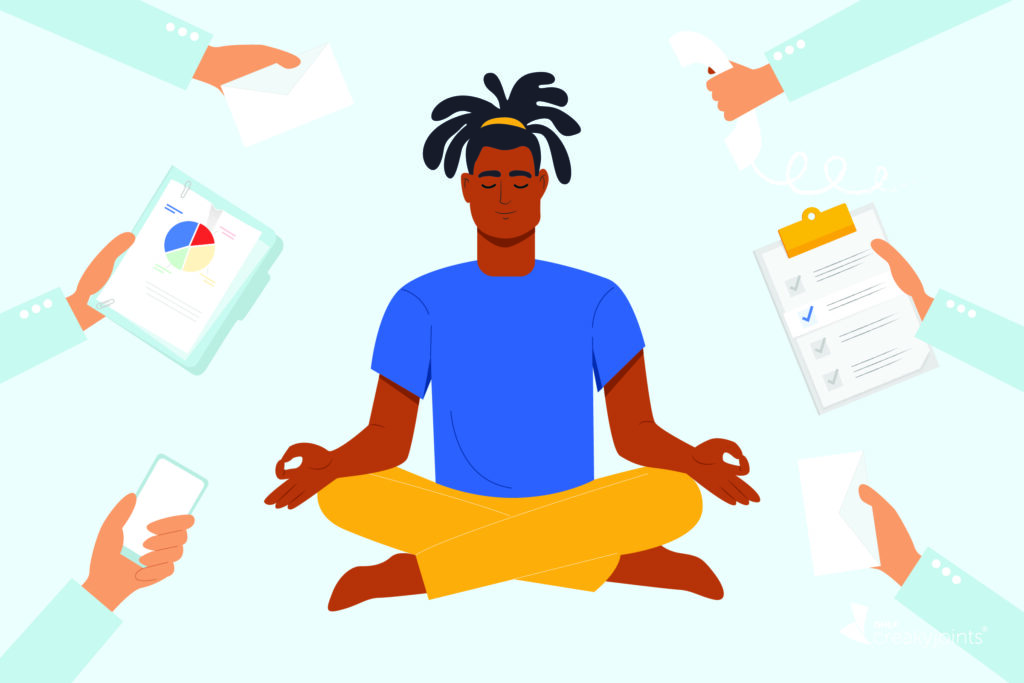The holiday season is over — it’s another year in the books. But after weeks of exciting entertaining, socializing, and overeating, your spoons may be depleted. Trying to get back into your regular routine may feel absolutely exhausting as you cope with fatigue, joint pain, and the demands and responsibilities of returning to post-holiday life.
Remember: Even if it takes some extra time to get your groove back, your body will thank you for dedicating the time and energy to it. Tomorrow is always a new day. Here are my best tips from one spoonie to another.
Take a Break
Take a real break. Don’t cook, clean, or entertain for three days and nights (or more if possible.) Rest is an investment, not an expense. You are entitled to this after a bustling holiday season. Let your body recover so it can recharge to perform the miracles that it performs for you every day.
Meditate
Take time out of your day to simply listen to your breath. This ancient practice is simple to do as it requires no training, special equipment, or travel time. Start with sitting in a silent room for just 15 minutes a day. This practice takes time to build, just like physical fitness. Meditation provides immeasurable mental health restorative benefits and can also help manage pain.
Spend Time Outdoors
It’s common to spend a disproportionate amount of time indoors during the holidays. Getting some extra sunshine, and the vitamin D that comes with it, will help to regulate your immune system in your time of recovery after the holidays.
Spend some extra time outdoors: plan an easy hike, eat lunch outside, or go for a walk during the day. If the sun doesn’t shine much where you live in the winter, simply being in nature can improve your mood, regardless of sunshine.
Organize Your Space
Whether you tackle your desk at work or your closet at home, dedicate time to cleaning it out. Personally, I always use this time to clean out my linens and pantry.
Sometimes purging unwanted or unnecessary items can help restore mental wellness. Plus, it’s fulfilling to find things that you may have forgot you had. Staying organized can also help you save money, preventing you from buying things you may already have.
Do Something Creative
Pick up a sketch pad and a pencil. Get some paints and a canvas. Make music any way you know how. Write a fairytale in a notebook. If you’re not creative on your own, take an introductory art class at your local recreation center, specialized art studio, or remotely online in the comfort of your own home.
All humans are creative to some degree, so don’t discount the benefit of this activity. Art as medicine can lead to improved quality of life, according to a study published in the American Journal of Public Health. Art therapy leads to better understanding of one’s deeper feelings, which is always beneficial to recovering spoons. Releasing some creative energy is rejuvenating and replenishing for the soul any time of year, but especially after the holidays.
Take a Social Media Break
Today’s world is full of social media photo opportunities that insist that we snap and post frequently, especially during the holidays. Social media is also a way that many people stay connected with family and friends. Take a break from scrolling and posting for a while after the holidays.
If you don’t have enough self-control, uninstall the apps from your phone or even have your spouse or family member change the password for you. The break will reset your mental fatigue — and it might even help improve some of your neck and wrist pain.
Stop Comparing Yourself
When you’re struggling after the holidays, it’s hard to see other able-bodied people recover so quickly. If you are active on RA-related social media, it may even be tough to see other RA-warriors recovering their spoons so well. What others do simply doesn’t matter. Your best is your best, and that’s the best you can do.
Do not compare yourself to others. If you must compare, be better than you were yesterday, and only compare to your previous personal best. My go-to affirmation to remind me of this is the Serenity Prayer. Although this has religious overtones, one does not have to be religious to find it meaningful and helpful.
Look to the Future
Plan something to look forward to. This can be a vacation, a get-together with friends, or even a health challenge. Putting the little energy you have left into planning and preparing something just for you may be more rewarding than expected when it’s all said and done.
Watch for Depression
Be aware of signs of seasonal depression. After the excitement of the holidays, the lull in activity combined with worsened RA symptoms of fatigue and pain can bring out some pretty strong feelings of sadness and despair. If you, or someone you know, is suffering from severe depression, get help right away. If you, or someone you know is having suicidal thoughts, call the National Suicide Prevention Lifeline at 998.
Be a More Proactive Patient with ArthritisPower
Join CreakyJoints’ patient-centered research registry to track your symptoms, disease activity, and medications — and share with your doctor. Sign up.
Cour P, et al. “Effects of Mindfulness Meditation on Chronic Pain: A Randomized Controlled Trial.” Pain Medicine. April 2015. doi: https://doi.org/10.1111/pme.12605.
Martens P, et al. “Vitamin D’s Effect on Immune Function.” Nutrients. April 2020. doi: https://doi.org/10.3390/nu12051248.
Stuckey H, et al. “The Connection Between Art, Healing, and Public Health: A Review of Current Literature.” American Journal of Public Health. February 2010. doi: https://doi.org/10.2105/AJPH.2008.156497.
Weir K. Nurture by nature. American Psychology Association. https://www.apa.org/monitor/2020/04/nurtured-nature.






